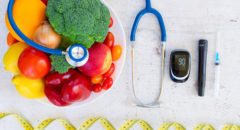
A long life free of heart disease does not come just from controlling the standard measures like blood pressure and cholesterol. Sure, keeping tabs on these indicators is essential to gauging your heart's health, but a few other numbers—some surprising—can be meaningful as well.
Take control of your health by learning these six numbers; they'll help with everything from losing weight to protecting your heart.
1. Your daily calorie needs.
This is not technically a measurement, but it can have a huge influence on your health. Most women need 2,000 calories a day for good health, and men generally need about 2,550. One way to work out your daily calorie needs is to multiply your weight in pounds by 13 to 15, depending on your activity level. But roughly, that's 300 to 400 calories for breakfast, 500 to 600 for lunch, 600 to 700 for dinner, and two or three snacks of roughly 100 to 200 calories each. Trying to lose weight? Eat roughly 500 calories less.
2. Your waist size.
Waist size is one of the best ways to measure whether your weight is affecting your heart health. Fat cells aren't just storage for extra calories; when body fat is packed into your abdomen, the fat cells release inflammatory chemicals and out-of-kilter levels of appetite-controlling proteins. Your risk of heart attack increases, and your risk of insulin resistance and metabolic syndrome goes up.
For women, health risk begins to rise when your waist is more than 35 inches. For men, risk increases with a measurement when your waist is over 40 inches. The best way to measure? Wrap a tape measure around your abdomen at or near your belly button. Keep it snug but not tight—and don't pull your stomach in.

3. Your LDLs and HDLs.
It's important to know not just your total cholesterol reading, but also your levels of "bad" LDL cholesterol and "good" HDLs. When you see your doctor for blood test results, ask for the readings for both forms of cholesterol and the ratio of your total cholesterol to HDLs (TC:HDL). Aim for total cholesterol below 5.2 mmol/l (below 5 mmol/l if you have heart disease or diabetes), and...
... LDL cholesterol levels below 3.5 mmol/l, or below 2 mmol/l if you have a history of heart disease. A healthy HDL level is 1.3 mmol/l or above.
4. Your blood pressure.
Blood pressure—the force of blood against the walls of your arteries—rises and falls normally during the day. When it remains elevated, you have hypertension (high blood pressure) and this carries a higher risk or atherosclerosis, heart disease and stroke.
A reading of 140/90 mm Hg or more is considered high, and if it's between 120/80 and 139/89, you may still be at risk and should be taking steps to prevent the development of hypertension.
How to check: Your doctor will check your blood pressure at every visit, but you can also buy a home blood pressure monitor, and studies have shown that people who check their blood pressure at home keep it under tighter control. But home monitoring should never replace the regular checks by your doctor or nurse—or visit a pharmacy, many of which have free-to-use blood pressure machines.
How often to check: Ask your doctor how often you should have your blood pressure (BP) measured. You can request a BP check every time you go to the office.
5. Your triglycerides.
Triglycerides are made from the fats and carbohydrates you eat, which are converted into a form that can be stored in fat cells. Triglycerides are also released from fat tissue when the body needs extra energy between meals. It's normal to have some triglycerides in your bloodstream, but high levels are linked to coronary artery disease—especially in women. When you have high triglycerides paired with low HDLs, your risk of insulin resistance and metabolic syndrome may be increased. A normal triglyceride reading is less than 1.7 mmol/l. Your doctor will advise you how often you should have your triglycerides checked.
6. Your morning pulse rate.
Your pulse is the number of times your heart beats in one minute. Regular monitoring of your resting pulse first thing in the morning will help you to see if your workouts are strengthening your heart. For example, a normal resting pulse rate is 60 to 90 beats per minute. People who are fit tend to have lower resting pulse rates because their heart muscles are in good shape. But if you don't exercise regularly and your heart rate is lower than the normal range, tell your doctor—it could be a sign of heart disease.
How to check: You'll need a clock or watch with a second hand. The pulse is best measured at the wrist or neck, where an artery runs close to the surface of the skin. To measure the pulse at your wrist, place your index and middle fingers on the underside of the opposite wrist. Press firmly with the flat of your fingers until you feel the pulse. Find a neck pulse either side of your Adam's apple: just press your fingers into the hollows wither side of your windpipe. Once you've found your pulse, count the beats for 15 seconds and multiply by four—this will give your pulse rate in beats per minute.
How often to check: Take your pulse once a month, in the morning before you get out of bed. To check if your exercise program is working, assess your maximum pulse just after exercise and note how long it takes to return to its normal resting rate—the time interval should reduce as you get fitter.









